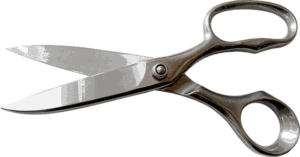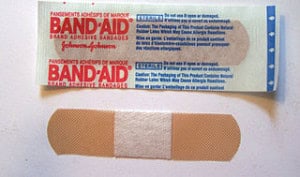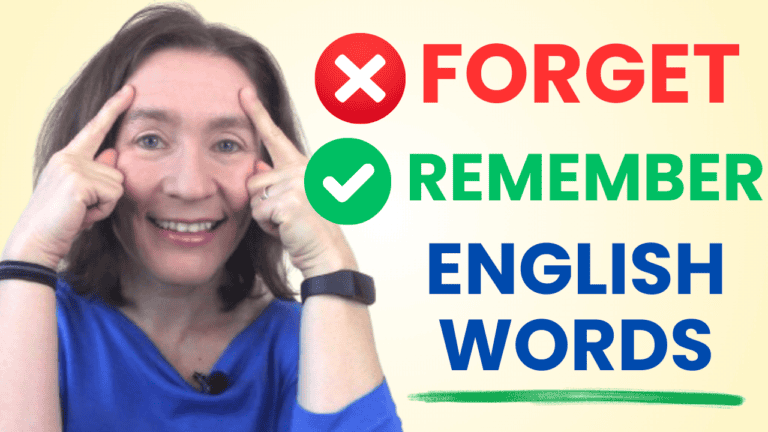
Hi there! It’s lesson 4 of our mini-course on words with multiple meanings, and we’re going to focus on the word CUT. Today you’ll learn 20 ways to use it – from different definitions, to phrasal verbs, to idioms.
cut = separate into pieces using something sharp
The basic meaning of CUT, which you already know, is to separate into pieces by using something sharp.
So you can cut a piece of paper with scissors, you can cut hair to make it shorter, cut a cake with a knife, and so on. In this case “cut” is a verb describing the action of separating by using something sharp.

cut = injury when your skin is separated by something sharp
The word “cut” also functions as a noun to refer to the injury you receive when your skin is separated by something sharp.
You can describe a cut in your skin as a deep cut or a nasty cut if it’s major, and a small cut or minor cut if it’s a little one.
When you get a tiny cut from the edge of a piece of paper, that’s specifically called a “paper cut” – and it hurts a lot!

cut = reduce
Getting back to “cut” being used as a verb, cut can also mean to reduce. This is often used with money. If a store cuts prices, it means it reduces its prices. If the government cuts taxes, it reduces taxes. If your company needs to cut costs, it means it needs to reduce the amount of money it is spending.
Informally, we often use the phrasal verbs “cut down” and “cut back” to talk about reducing things other than money – especially food. If you want to be healthier, you should cut down on sugary and fatty foods. Or maybe you’re drinking too much beer, and you decide to cut back – to reduce the amount of beer you drink.

cut = remove or delete
“Cut” can also mean to remove or delete completely, and this is most often used when talking about text, plays, and movies or TV shows.
If I’m editing an article and I see a paragraph that would be confusing to the reader, I might cut that paragraph – delete it completely. Or the producers of a movie might decide to cut a scene that doesn’t contribute to the story line – they would remove or delete that scene.
cut = a part of something
The word “cut” as a noun can mean a part of something. For example, when talking about a cut of meat – that means meat from a specific part of the animal. A few examples of different cuts of beef are ribs, tenderloin, and flank steak. There are many different cuts of meat and they vary from country to country.
Another place “cut” means part is when talking about “a cut of the profits” meaning a part or portion of the profits. A company that has salespeople might offer them a 10% cut of the profits in order to motivate them to make more sales – that means they would receive a 10% part or portion of the profits.

cut = handle something successfully (informal)
One informal use of “cut” is to be able to manage or handle something successfully, and this is most frequently used in the negative expression saying that something “doesn’t cut it” or “can’t cut it.”
For example, “He was a pretty good student in high school, but he couldn’t cut it in college.” – meaning he couldn’t handle the college classes successfully. Or maybe there’s a new employee who is not doing her work very well – she’ll lose her job soon if she doesn’t cut it.
cut = hurt someone’s feelings
“Cut” can also mean to hurt someone’s feelings – usually hurting someone’s feelings with words or comments. If your ex-boyfriend said something really mean to you, you could say “His comment cut me deeply” – meaning it hurt your feelings badly.
Two more ways to express this are saying that the comment “cut me to the quick” or “cut me to the bone” – again, these mean that the comment hurt your feelings a LOT.
This use also appears in the expression “a cutting remark” – meaning a statement that hurts feelings. If your mother loves you, but you tell her something like “You’ve never really cared about me” – that would be a cutting remark.

cut in line = enter the line in front of other people
Let’s finish with three more quick and specific uses of “cut” – one is to “cut in line.”
There’s a line of people waiting for something – like waiting to go on a ride at the amusement park – and if someone cuts in line, it means that instead of going to the correct place at the end of the line to wait their turn, they enter in the middle of the line, in front of other people who have been waiting longer. Cutting in line is considered rude and unacceptable behavior.
cut class = not attend class
If a student “cuts class,” it means they do not attend a class in which they are supposed to be present. Maybe a rebellious teenager would cut class in order to go shopping with her friends instead. She’s supposed to be in class, but she cuts class – she doesn’t go.

cut a check = a company writes a check
Finally, you’ll sometimes hear the expression “cut a check” which means to write or fill out a check, a piece of paper that you can deposit in the bank to get money.
For example, if you spent some money while on a business trip, and then you show your receipts to the company, the company will often cut a check (write a check) to compensate you for those expenses. It’s typically a company or business that “cuts a check,” if an individual person does it, we usually say “write a check.”
Phrasal verbs with CUT
All right, let’s move on to some phrasal verbs. You already learned that cut back and cut down are both used for reducing – cut down on fast food, cut back on expenses – but there are several more.
A very common one is cut off, and this has several meanings. First is the literal meaning to separate something from something else, by cutting – you would cut tags off of new clothes, or cut the top off a carrot. But cut off can also mean to turn off or stop supplying. If you don’t pay your electric bill, then the company will cut off your electricity. It will turn it off or stop providing it.
Or let’s say there are parents who are paying for their son’s college education and also giving him spending money, but the son is partying a lot and not taking his studies seriously – the parents might choose to cut him off, stop supplying him with money.
In the context of conversation, cut someone off means to interrupt them while talking – for example, I was trying to explain the situation, but my manager kept cutting me off – he kept interrupting by talking in the middle of my explanation.

The phrasal verb cut in also means to interrupt in a conversation. Maybe I’m trying to have a talk with my friend, but my little sister always tries to cut in – she tries to enter the conversation.
What’s the difference between “cut off” and “cut in” meaning to interrupt?
“Cut in” has more of the sense of entering a conversation by interrupting, because the person wants to participate and be included… and “cut someone off” has more of the sense of interrupting in order to stop another person from saying something or finishing their sentence.
To cut across means to go through an area so as to make your trip shorter. For example, if you’re on a bike, then instead of following the road around the park, you could cut across the park – go through it – in order to get home faster. A route that is a shorter one and saves time can be called a shortcut.

Now let’s look at cut out – this is also used in several different ways. Cut out means to physically remove, so you can cut shapes out of paper. If you cut somebody out of your life, it means you completely stop having a relationship with them; you remove them from your life. If your parents were abusive, then you might choose to cut them out of your life by refusing to see them or have any contact with them.
We also have the expression “Cut it out!” which means “Stop doing that!” If your kids are being loud and noisy while you’re trying to read a book, you could say “Cut it out!” or “If you kids don’t cut it out, I’m going to send you to your rooms.”
And finally you can say you’re “not cut out for something” or “not cut out to do something” – this means you don’t have the type of skills/personality for that job or lifestyle.
So if you feel sick when you see blood, you could say “I’m not cut out for a career in medicine.” If you can’t stand kids, you could say “I’m not cut out to be a parent” – again, it means that job or that lifestyle wouldn’t suit you; you wouldn’t be good at it or enjoy it.

Idioms with CUT
OK, let’s finish our lesson with some idioms.
Sometimes you’ll hear something being described as “a cut above” everything else – this means it is superior to other things in its category. Maybe there are 10 candidates for a job, but one is a cut above the rest because she has an advanced degree – she is better than, or superior to, the others.
One thing you probably shouldn’t do is cut corners – that means to save money or effort by doing things in a cheaper or quicker way, which leads to a result or product of lower quality. Maybe you’re building a table for a customer and you cut corners by using the cheapest wood – but then the table is weak and breaks easily.
Or if you’re writing an important article and you cut corners by just checking the facts briefly, without doing detailed research – that could result in errors in the article, because you cut corners – you took the easier way to save time/effort.
Another common expression is to cut your losses. This describes when you’ve already put a lot of time, money, and effort into a project, but it’s not making progress – so you decide to stop. Deciding to stop is cutting your losses.
Maybe you tried to start a business, and you spent $10,000 and two years buying supplies and advertising your products, but there aren’t a lot of sales – so you cut your losses; you stop working on or investing in this failing project before you lose any MORE time or money.

One phrase you might hear in everyday English is, “That’s cutting it close.” To cut it close means to do something very close to the time limit, so you are in danger of missing it. For example, if you’re traveling and you have a connection – you need to get off one airplane and transfer to another one – and you only have 15 minutes to make the connection, that’s cutting it close. You have very little time to get on the second plane before it leaves.
What does it mean when you’re talking and someone asks you to “cut to the chase”? It means they want you to hurry up and get to the point fast. If you cut to the chase, you don’t talk about extra details or do any polite introductory conversation – you just go right to the main point.
Let’s say your manager, who is very busy, calls a meeting of the team at work. He starts the meeting by saying – “I’ll cut to the chase – we’re not getting good results and we need to improve.” He didn’t make any introductory comments, he didn’t say a bunch of other things before, he went directly to the main point. That’s what it means to cut to the chase.
I try to cut to the chase in my English lessons – get directly to the most important information, without a lot of extra stuff.

Our final expression is to “have your work cut out for you.” This means you have a large and difficult task to do. It can be used for any task – tasks at your job, projects at school, responsibilities at home, and so on.
Imagine you buy a house that is 100 years old, and it’s in pretty bad condition. You’re planning to renovate it – to repair it and make it new – but you have your work cut out for you – meaning the task is very big and challenging.

I would also say you have your work cut out for you when it comes to learning all these definitions – it’s not an easy task! But I hope the examples in this lesson have helped. Make sure to do the exercise so that you can practice. Thanks for watching, and I’ll see you in the next lesson.










